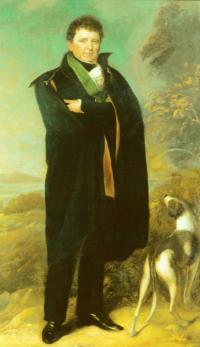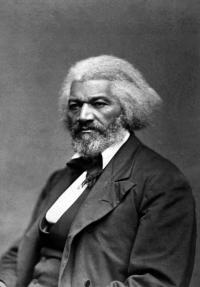Daniel O’Connell and the campaign against slavery
Published in 18th–19th - Century History, Features, Issue 5 (Sept/Oct 2010), Volume 18
Daniel O’Connell by Joseph Haverty. While in Ireland we associate O’Connell either with the success of Catholic Emancipation or the failure of Repeal, his international reputation was based on his opposition to slavery. (Reform Club, London)
Three years before his death in 1847, Daniel O’Connell was celebrated in Martin Chuzzlewit, the novel of his favourite writer, Charles Dickens. The section of the book (see panel above) was based on a real-life account of a Delaware Repeal Association meeting, and confirmed O’Connell in his reputation as one of the great international champions of the anti-slavery movement and a fearless opponent of injustice in all its forms.
Young Ireland criticism
O’Connell’s views on slavery lost him much support, but he was determined to do what was right no matter what the cost. Many people in the United States, even those who did not support slavery, resented being lectured to by an Irishman. O’Connell’s public declarations on slavery were also a key factor in alienating the Young Irelanders. They believed that the Repeal Association should only address domestic, not international, affairs, and they were uncomfortable with the aggressive way O’Connell was alienating real and potential supporters in the United States. Charles Gavan Duffy later wrote of how the time was not right ‘for gratuitous interference in American affairs’, and this was the general view. Attacks on slave-owners in the United States were considered ‘wanton and intolerable provocation’. John Blake Dillon was furious with O’Connell’s attacks on the United States in 1845 and reported to Thomas Davis on how ‘everybody was indignant at O’Connell meddling in the business’. ‘Such talk’, he declared grandly, was ‘supremely disgusting to the Americans, and to every man of honour and spirit’.
O’Connell in Martin Chuzzlewit
In Charles Dickens’ Martin Chuzzlewit, O’Connell is discussed in the section set in the United States, though he is not mentioned by name. When Chuzzlewit attends a meeting of the Watertoast Association held at the National Hotel in the fictional ‘Eden’, he hears that the members are about to send a large sum of money to ‘a certain Public Man’ in Ireland, to help him in his campaign against England. However during the proceedings a package arrives from England containing extracts from several newspapers, and when these are studied a change comes over the face of the chairman, General Cyrus Choke, ‘involving such a huge amount of choler and passion, that the noisy concourse were silent in a moment’. ‘“My friends!” cried the general, rising, ‘my friends, and fellow-citizens, we have been mistaken in this man’. ‘In what?’ asked the crowd. ‘In this’, the general replied, holding up the letter he had read aloud a few minutes earlier: ‘I find that he has been, and is, the advocate—consistent in it always too—of n****r emancipation!’ It is revealed that had the ‘certain Public Man’ been there in person ‘those sons of freedom would have pistolled, stabbed—in some way slain—that man by coward hands and murderous violence… They tore the letter, cast the fragments in the air, trod down the pieces as they fell; and yelled, and groaned, and hissed, till they could cry no longer’.
From the beginning, O’Connell’s aggressive assaults on slavery in the United States drew attention. When he addressed an anti-slavery meeting in London in 1829, he declared that ‘of all men living, an American citizen, who is the owner of slaves, is the most despicable’. In the same year he addressed the annual meeting of the Cork Anti-Slavery Society and praised ‘The Liberator’ of South America, Simon Bolivar, for his anti-slavery policies. He then contrasted Bolivar with his counterparts in North America and abused George Washington for owning slaves: ‘America, it is a foul stain upon your character!’ And he regularly insisted that, though he often longed to go to America, ‘so long as it is tarnished by slavery, I will never pollute my foot by treading on its shores’.
Even during his political campaigns, O’Connell found time to address meetings on the subject of slavery. While on a whirlwind tour of Scotland in 1835, he spoke to the Emancipation Society at Glasgow and delivered a furious attack on the United States for its cruel laws. Within minutes he had the crowd in tears, as he spoke movingly of the slave father returning home from the fields and shuddering when he saw his children because of the knowledge that they must inherit his misery. And he reminded them of the slave mother, who ‘looks upon the child she has borne, and knows that she is but rearing the slave of another’. His closing words haunted his listeners: ‘Instead of a blessing, she feels that in each child she has been visited with a curse’.
US ambassador accused of being a ‘slave-breeder’
O’Connell’s attacks on the United States almost resulted in a duel with the American ambassador to Britain. A major anti-slavery meeting was held at Birmingham on 1 August 1838 to celebrate the abolition of black apprenticeship (slavery in all but name) in the West Indies. In advance of the meeting, O’Connell called for the launch of a new crusade against slavery, attacking ‘the vile union of republicanism and slavery’, and expressing his hope that the day would come ‘when not a single American will be received in civilised society unless he belongs to an anti-slavery union or body’. At Birmingham, O’Connell was the final speaker, and his appearance was greeted with cheers and applause. Once again O’Connell attacked Washington for owning slaves and for waiting until his death before freeing them. Perhaps unwisely, he then launched into an attack on the United States ambassador to Britain, accusing him of being a ‘slave-breeder’, and wondering aloud whether it was ‘possible that America would send a man here who traffics in blood?’ Slave-breeding was a serious allegation at the time, far worse than simply owning slaves, for it suggested that owners treated their slaves like animals, encouraging (and sometimes forcing) them to breed, and then selling the offspring for profit.
The ambassador in question was a wealthy Virginian landowner, Andrew Stevenson. He had been Speaker of the House of Representatives before his appointment in 1834 to the court of St James (an appointment that was only confirmed by the Senate in 1836), and he was enraged that he had been attacked so publicly. O’Connell was ordered to withdraw the comments or fight a duel, but he refused to do either. Instead, he declared that until slavery was abolished in the United States ‘no American slaveholder ought to be received on a footing of equality by any of the civilised inhabitants of Europe’. And he spoke movingly about the madness that mothers must feel when their children were taken away from them and sold into slavery.
Word of the dispute travelled across the world. The former president of the United States, John Quincy Adams, even brought the matter before the floor of the House of Representatives. On 6 December 1838 he explained that he wished to expose ‘a conspiracy against the life of Daniel O’Connell’. He returned to this subject again in January 1839, denouncing the proposed challenge to O’Connell as ‘a threat of assassination by one ruffian. That was a conspiracy’. The resolution that Adams proposed, attacking Stevenson, was defeated but the debate caused a considerable impression in the United States.
O’Connell’s speech to the first World Anti-Slavery Convention in London in June 1840 was one of his great orations. According to William Lloyd Garrison, a leading abolitionist in the United States who edited the newspaper The Liberator, he was ‘received with a storm of applause that almost shook the building to its foundations’. Garrison would later publish a selection of O’Connell’s speeches in the United States. He believed that the powerful words ‘scathe like lightning and smite like thunderbolts’, and he insisted that no man in the wide world had ‘spoken so strongly against the soul-drivers of this land as O’Connell’.
Money from slavery supporters not accepted
Although O’Connell was desperate for money from the United States for his Repeal campaign, he insisted that no money would be accepted from anybody who supported slavery. Many Irish people were concerned that O’Connell risked damaging the cause of Repeal by his inflexibility. A friend of O’Connell’s pleaded with him at this time to be friendly towards the American slave-owners because they were so powerful. ‘No’, replied O’Connell, ‘what care I for the vagabonds were they twice as powerful?’ His friend then asked him at least to remain silent on the question, claiming that he injured ‘our question by mixing it up with the slavery question’. Again O’Connell disagreed. Virtues, he said, would be strengthened by being combined, and he insisted that ‘it is ourselves alone must work out Repeal’.
To black Americans O’Connell became not just a hero and a champion but an inspiration. Charles Lenox Remond, the great black abolitionist, heard O’Connell speak in London in 1840 and was profoundly moved by his oratory. Reflecting on it immediately afterwards, he declared that for thirteen years ‘I thought myself an abolitionist’, but that it was only when he heard that speech that he realised what being an abolitionist really meant. He said that ‘every fibre of my heart contracted’ when he ‘listened to the scorching rebukes of the fearless O’Connell’, and he praised his ‘soul-stirring eloquence and burning sarcasm’.
Frederick Douglass’s 1845 visit to Ireland

Frederick Douglass, the most famous black abolitionist of the nineteenth century. On his 1845 visit to Ireland, the Liberator introduced him to a meeting as ‘the black O’Connell of the United States’. (George K. Warren)
When Frederick Douglass, the most famous black abolitionist of the nineteenth century, visited Ireland in 1845 as part of his campaign against slavery, he insisted on meeting Ireland’s most vocal opponent of slavery, and they spoke together at an anti-slavery rally. Not someone who lacked either self-confidence or self-regard, O’Connell introduced Douglass as ‘the black O’Connell of the United States’. There was a loud welcome, and Douglass delivered a striking oration to the massive crowd that had gathered to hear him. In his own speech, O’Connell noted that, though he hated oppression wherever it existed, ‘my sympathy is not confined to the narrow limits of my own green Ireland’. ‘My heart walks abroad,’ he announced, ‘and wherever the miserable is to be succoured, and the slave is to be set free, there my spirit is at home, and I delight to dwell in its abode.’ In Ireland we tend to think of O’Connell in purely local or national terms, as the man who won Catholic Emancipation, and who failed in his campaign for Repeal. But his international reputation was forged in the fires of his campaign against slavery. As Frederick Douglass recognised, when O’Connell died it was not just a blow for Ireland—it was the end of ‘a great champion of freedom’. HI
Patrick M. Geoghegan is Associate Dean of Research at Trinity College, Dublin.
Further reading:
M.J. Bric, ‘Daniel O’Connell and the debate on anti-slavery, 1820–50’, in T. Dunne and L.M. Geary (eds), History and the public sphere: essays in honour of John A. Murphy (Cork, 2005).
P. Geoghegan, Liberator: the life and death of Daniel O’Connell, 1830–1847 (Dublin, 2010).
C. Kinealy, ‘The Liberator: Daniel O’Connell and anti-slavery’, History Today (December, 2007).
M. Robinson, ‘Daniel O’Connell: a tribute’, History Ireland (Winter 1997).
















